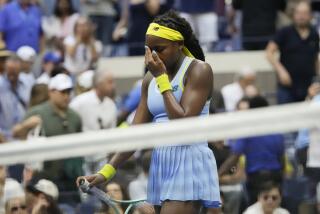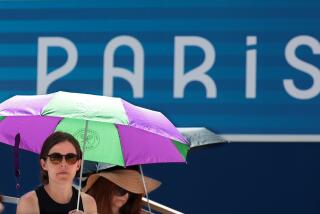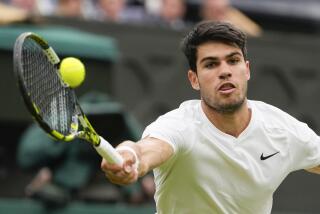Quarterfinalists from opposite corners
- Share via
PARIS -- The phrase “Latvian tennis” doesn’t tend to come up in conversation, and the phrase “Canary Islands tennis” sounds odd given that most people go to Spain’s Canary Islands to avoid exertion such as tennis.
Still, somehow, against global odds, both phrases have popped up at the 2008 French Open because both places have sent out sudden 19-year-old quarterfinalists born four days apart in the late summer of -- please don’t spit out your coffee -- 1988.
From extreme northeast Europe here’s Ernests Gulbis, surely coming to a world top 20 near you, and from extreme southwest Europe here’s Carla Suarez Navarro, the Canary Islander and qualifier whose ranking figures to bounce from its present-day 132.
Here’s the first of the 2.2 million Latvians to say, “I’m the first guy who is in the top 100 from Latvia,” as Gulbis put it. “There was one man who was 300, only, before me.”
In fact, the upper crust of Latvian sports were pretty much limited to hockey, soccer and basketball -- at which Gulbis’ grandfather, Alvils Gulbis, excelled on the old Soviet national team as well as the 1958 European champion club. A few years ago, Gulbis said, the national government gave only about $8,000 worth of lats, the Latvian currency, for tennis.
Then this wunderkind came along and literally altered the landscape, after he arrived at the 2007 U.S. Open having played all of 23 career matches, yet reached the fourth round.
Now . . .
“I mean, the courts in Latvia are fully booked always,” he said. “If I go practice at home, I don’t get a court, really. It’s full.”
With a businessman for a father, a theater actress for a mother, a movie director for a maternal grandfather, and four siblings including a student in England, it’s no wonder Ernests jet-setted Munich at 12, entering the tennis academy of Niki Pilic, the Croatian who lost the 1973 French Open final to Ilie Nastase.
There, Gulbis would meet one Novak Djokovic, fellow Pilic pupil, Serbian, now barely 21 himself, the Australian Open champion and, look here, Gulbis’ quarterfinal opponent.
“Already then he was very powerful,” Djokovic said. “So he was about to grow up and, as you can see, he’s very tall (6 feet 2). He’s using his height for his serve, which is one of his biggest weapons. He makes a life really difficult for his opponents when he’s serving well.”
Djokovic, ranked No. 3, claimed Gulbis “was destroying me in practices” two or three years ago. “I couldn’t win a match. . . . So all the pressure on him, OK?”
Still, this clay surge by the Latvian would be unanticipated, especially since, as Gulbis said, “One year ago, I was playing pretty stupid on clay.” One year later, he plays with calm and maturity that seem preternatural.
Said France’s Michael Llodra, Gulbis’ fourth victim on a list that includes eighth-ranked American James Blake and capable Ecuadorean Nicolas Lapentti, “You don’t defeat Blake and Lapentti just by chance. So I probably overestimated him rather than underestimated him,” and either way, lost in straight sets, 6-4, 7-6 (4), 6-3.
People did not so much underestimate Suarez Navarro as not estimate her at all. This one of the 2 million Canary Islanders had played in only two Grand Slam tournaments, a total of four matches, before this; now she has weathered the qualifying and beaten four main-draw opponents who included Amelie Mauresmo and, in a 6-3, 6-2 wipeout Sunday, 30th-ranked Flavia Pennetta, the woman who ran off Venus Williams.
Suarez Navarro’s supporters here have included one Arantxa Sanchez-Vicario, three-time French champion, who “gives me courage,” Suarez Navarro said in Spanish through an interpreter.
Asked about growing up watching such bright Spanish lights as Sanchez-Vicario and Conchita Martinez, Suarez Navarro reminded listeners that when the former won her first Grand Slam title here in 1989, “I was one year old. This is something you need to realize.”
Role modeling, for her, came more from a Spaniard who also happened to hail from the Canary Islands, Marta Marrero, who at 17, in 2000, became only the second qualifier in the Open era to reach the French quarterfinals. By now there have been four, two from a single set of islands off the coast of Africa and belonging to Spain.
“At the end of the day on an island you’re a bit limited, and people have to leave at one stage,” Suarez Navarro said. “They have to go somewhere else,” and she has gone, last year, to begin training in Barcelona, and then, this year, to a big set of quarterfinals in Paris.
In heaving a ball airborne upon that accomplishment, she said, “I was just thinking about this beautiful victory.”
--
(BEGIN TEXT OF INFOBOX)
French Open
A look at Day 8 of the French Open and a look ahead to today’s competition (world rankings in parentheses):
WHO WON
* Rafael Nadal, Spain (2) -- defeated Fernando Verdasco, Spain (23), 6-1, 6-0, 6-2. This slaughter proved emphatic even for Nadal, who reached 25-0 lifetime at Roland Garros and 12-0 in sets at this French Open. Total games lost: 22. Average per set: 1.83. And falling, round-by-round.
* Those Incredible Serbians -- In a Serbian triple-header on the main court, Ana Ivanovic (2), Jelena Jankovic (3) and Novak Djokovic (3) played seven sets and lost none. Ivanovic didn’t lose even a game against 77th-ranked Petra Cetkovska of the Czech Republic. Jankovic won a point after falling on her backside during the middle of a rally against Poland’s 15th-ranked Agnieszka Radwanska. And Djokovic quelled some French exuberance by beating 19th-ranked Paul-Henri Mathieu, 6-4, 6-3, 6-4.
* Ernests Gulbis, Latvia (80) -- defeated Michael Llodra, France (41), 6-4, 7-6 (4), 6-3. Look out for this 19-year-old James Blake vanquisher, who also reached the fourth round of the 2007 U.S. Open. “You don’t defeat Blake and [Nicolas] Lapentti just by chance,” Llodra said.
* Carla Suarez Navarro, Canary Islands, Spain (132) -- defeated Flavia Pennetta, Italy (30), 6-3, 6-2. A qualifier, Suarez Navarro has barged clear to the quarterfinals, throwing a ball in the air in celebration on Sunday and saying, “I was just thinking about my beautiful victory.”
WHO LOST
* The Women Who Beat The Williams Sisters -- They certainly didn’t sustain momentum. Pennetta, who beat Venus Williams with impressive rigor, crashed to Suarez Navarro, and Katarina Srebotnik of Slovenia (24), who looked strategically wise in beating Serena Williams, didn’t stay long in just her second fourth round in 35 Grand Slam tournaments, losing to 11th-ranked Patty Schnyder of Switzerland, 6-2, 6-4.
* French guys -- France placed five men in the final 16, despite not having the injured Richard Gasquet and Jo-Wilfried Tsonga. But the quintet started peeling away Sunday when Llodra went out quickly to Gulbis, Mathieu went out quickly to Djokovic and 145th-ranked Jeremy Chardy bowed in straight sets to Spain’s 20th-ranked Nicolas Almagro.
TODAY’S MATCHES TO WATCH
* Roger Federer, Switzerland (1), vs. Julien Benneteau, France (55) -- Federer’s half of the draw includes players ranked 55, 25, 88, 30, 59, 22 and 5 (David Ferrer). It gives him a pretty good chance of getting to lose again to Nadal in the final.
* Robby Ginepri, U.S. (88), vs. Fernando Gonzalez, Chile (25) -- When one of Ginepri’s coaches, Diego Moyano, told Ginepri he should reach the quarterfinals, it might have seemed like joking. Win this, and it was spot-on.
* Maria Sharapova, Russia (1), vs. Dinara Safina, Russia (13) -- Could be good stuff. Safina would count as one of the hottest players on tour, having torn through three top-10 opponents in Berlin before getting to Paris, then losing only 12 games in six sets once here.
* David Ferrer, Spain (5), vs. Radek Stepanek, Czech Republic (22) -- Ferrer already reached a U.S. Open semifinal (2007) and worked his way all the way up to No. 5, but if he came to your door sometime next week, you probably wouldn’t recognize him.
-- Chuck Culpepper
More to Read
Go beyond the scoreboard
Get the latest on L.A.'s teams in the daily Sports Report newsletter.
You may occasionally receive promotional content from the Los Angeles Times.










